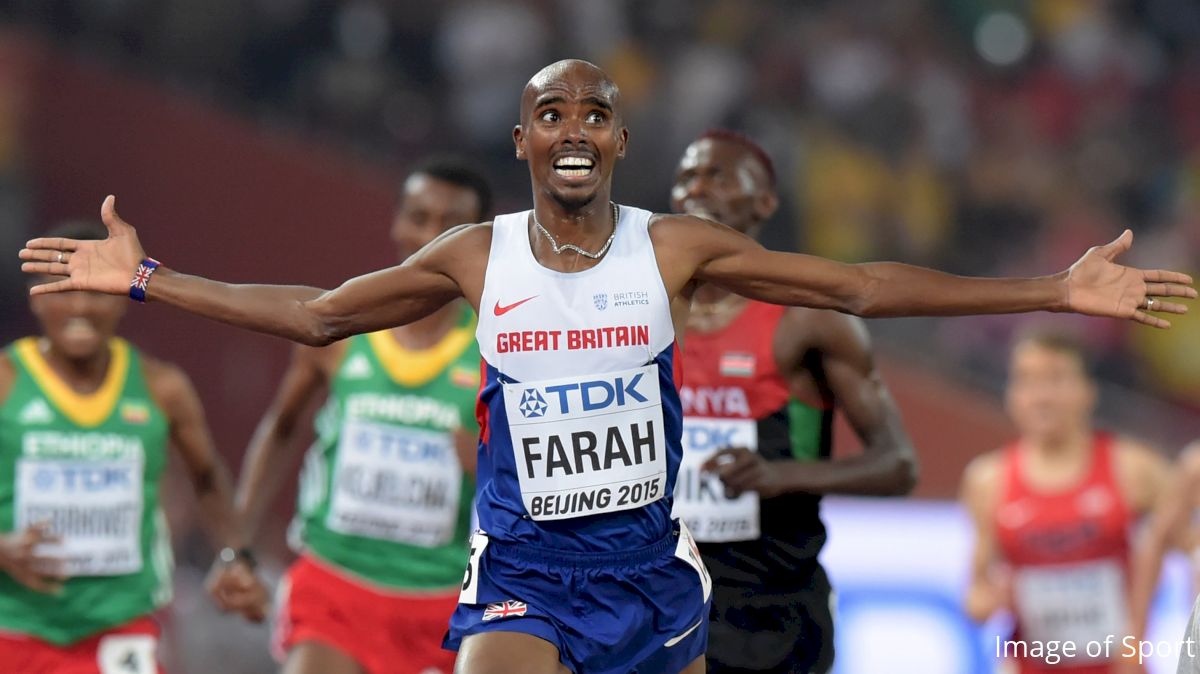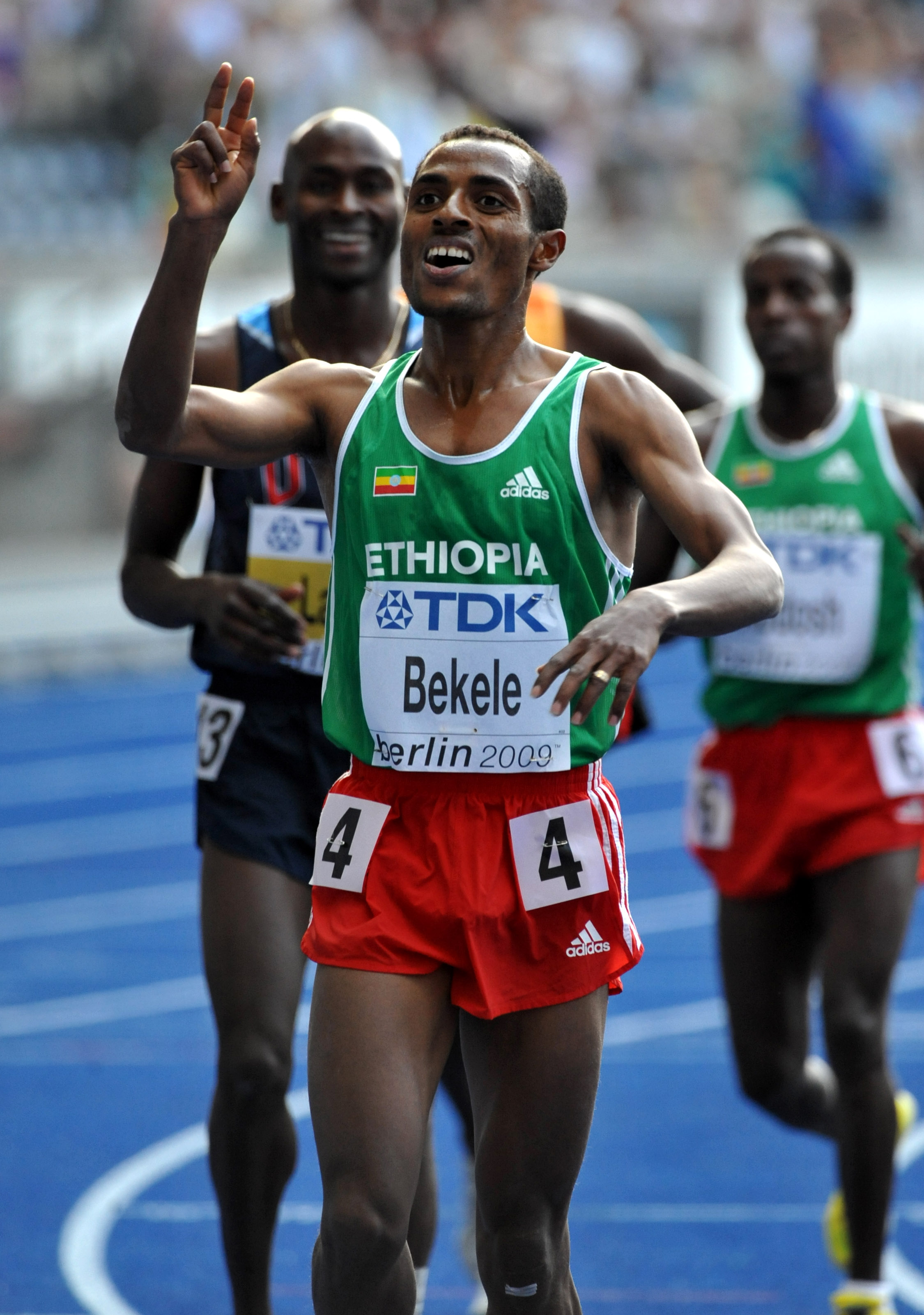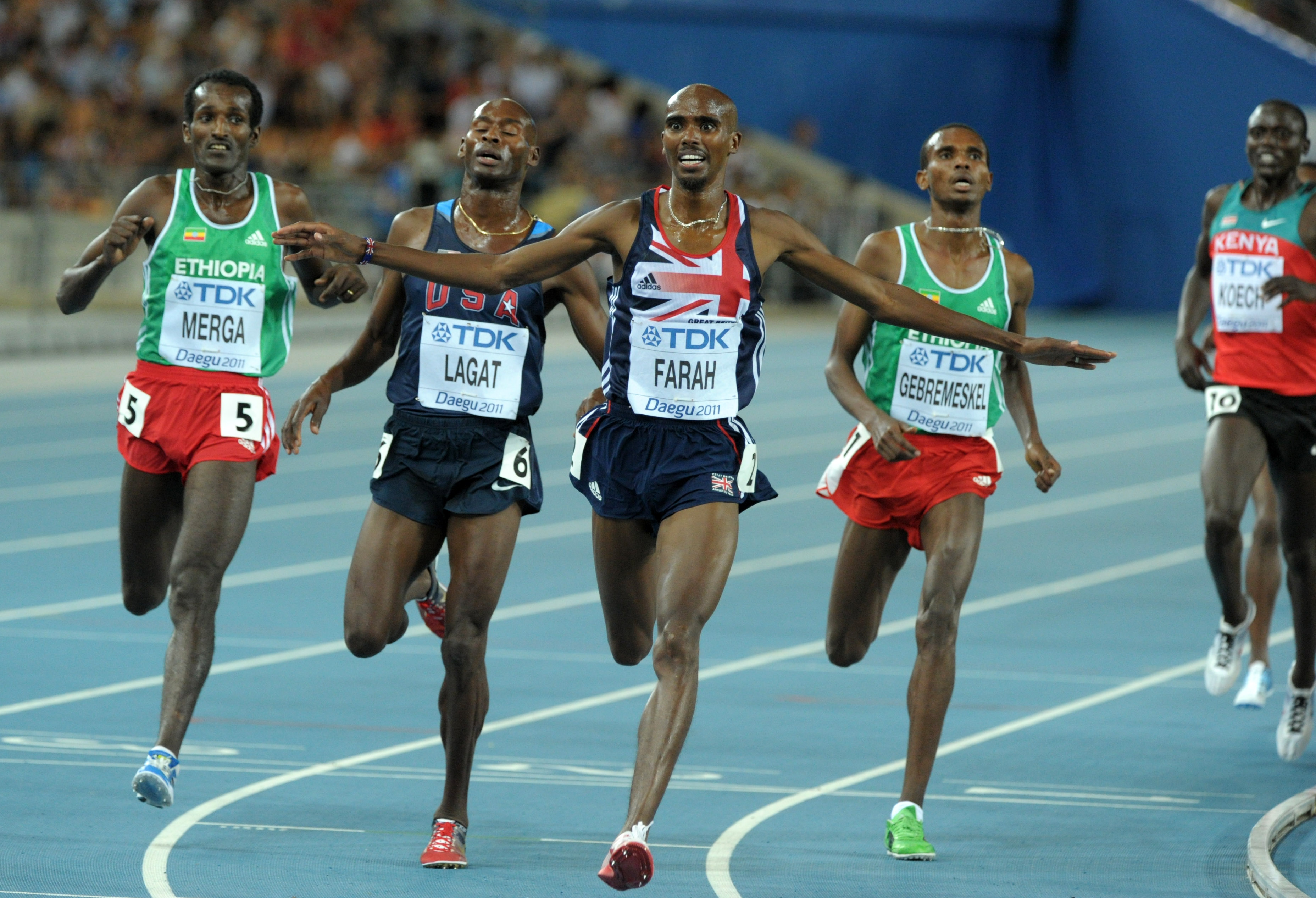2016 Olympic GamesAug 13, 2016 by AT Flotrack
Ethiopians Get Ready For 'Operation Mo'
Ethiopians Get Ready For 'Operation Mo'
By Elshadai Negash On a dreary Wednesday morning in the heart of Ethiopia's capital, the Addis Ababa stadium, athletes line up for another training session

By Elshadai Negash
On a dreary Wednesday morning in the heart of Ethiopia's capital, the Addis Ababa stadium, athletes line up for another training session as those outside of the 25,000-capacity venue shuffle across the streets to get to work before rush hour.
The runners proceed to the track for a warm-up followed by hard intervals: 4x400m, 2x1000m, and 4x800m repeats. Head coach Hussein Shebo patiently looks on and shouts split times.
The focus on speed reflects Ethiopia's growing ambition at ending Mohammed ("Mo") Farah's five-year dominance of major championship 5,000m and 10,000m races. In all but one race in the last four major championships (Beijing '15, Moscow '13, London '12, Daegu '11), the Brit took his time in the lead pack before overpowering his rivals in either the last 200m or 400m to clinch the victory.

"We are not just preparing for Mo Farah," said Shebo, who is under pressure to return Ethiopia back to the glory days of Kenenisa Bekele and Haile Gebrselassie without necessarily having the talent to accomplish the task.
"In the 10,000m, there is the Kenyan half marathon champion [Geoffrey Kamworor] who is a big threat. There are also a number of other strong guys in the 5,000m. We will not have easy races."
Throughout the last three winter months, a group of Ethiopian athletes and their coaching staff have been plotting a return to the country's days of dominance over the 5,000m and 10,000m. Everyone here knows, has competed, won, and lost against the man responsible for relegating Ethiopia's men to also-rans over these events in the last five years.
In a bid to stop Farah's dominance over the 5,000m and 10,000m at major championships, Ethiopia has gathered a youthful and experienced squad. The challenge in the longer event is led by former world junior champion Yigerem Demelash, who ran a world-leading 26:51.11 on the way to winning a trial race in Hengelo, Netherlands, at the end of June. Having warmed up for the Games with a 13:05.64 at the Stockholm Bauhaus Galan IAAF Diamond League meet, Demolish is heading to Rio with confidence.
Demelash will be joined in the men's 10,000m by two compatriots who will make their major championship debuts in Rio. Tamirat Tola returns to the 10,000m after a successful stint on the road which included a 2:06.14 at the Standard Chartered Dubai Marathon, and a fifth-place finish at the IAAF World Half Marathon Championships in Cardiff earlier this year. Having lost twice to Farah this year -- in Cardiff, where Farah finished third, and in the Eugene 10,000m, where he took third behind the victorious Farah -- Tola is well aware of the Brit's tactics.
Rounding out the team is youngster Abadi Embaye, who, at 17 years old, is Ethiopia's youngest entrant across all sports in Rio. The national 10,000m champion finished third in the qualifying trial race behind Demelash and Tola, and boasts a 5,000m season's (and personal) best of 13:02.49 from the Shanghai Diamond League in May.

While Ethiopia lines up fresh in the 10,000m, its trio of 5,000m runners come to Rio with relative experience. Four years ago in London, Dejen Gebremeskel broke the hearts of his compatriots when he made a late tactical error to lose sight of Farah and gold in the 5,000m final. After a few start-stop seasons with injuries and loss of form, Gebremeskel is back seeking revenge.
His teammate Hagos Gebrehiwet, on the other hand, travels to Rio in a bid to improve on a succession of bronze medals from the last two world championship 5,000m races in Moscow '13 and Beijing '15. After capturing world attention with a scintillating world junior cross country gold in Bydgoszcz, Poland, in 2013, Gebrehiwet is looking for consistency to elevate his status from one-hit junior wonder to a megastar in senior competitions.
But if he can halt a late-season decline, the likely challenger to Farah's dominance is Mukhtar Edris, Ethiopia's former world cross country junior bronze medalist.
Like Gebremeskel and Gebrehiwot, Edris has been plagued by inconsistency since making his senior major championship debut in 2013. But he transformed his fortunes in 2016 after running a world-leading time of 12:59.23 and leading the event's Diamond race following wins in Shanghai and Eugene.
Unlike his two teammates who have fallen flat when Farah and other rivals kick at 200m, Edris has repeatedly come up with strong finishes this year to give Ethiopia a fighting chance at gold over the 5,000m.
On a dreary Wednesday morning in the heart of Ethiopia's capital, the Addis Ababa stadium, athletes line up for another training session as those outside of the 25,000-capacity venue shuffle across the streets to get to work before rush hour.
The runners proceed to the track for a warm-up followed by hard intervals: 4x400m, 2x1000m, and 4x800m repeats. Head coach Hussein Shebo patiently looks on and shouts split times.
The focus on speed reflects Ethiopia's growing ambition at ending Mohammed ("Mo") Farah's five-year dominance of major championship 5,000m and 10,000m races. In all but one race in the last four major championships (Beijing '15, Moscow '13, London '12, Daegu '11), the Brit took his time in the lead pack before overpowering his rivals in either the last 200m or 400m to clinch the victory.

"We are not just preparing for Mo Farah," said Shebo, who is under pressure to return Ethiopia back to the glory days of Kenenisa Bekele and Haile Gebrselassie without necessarily having the talent to accomplish the task.
"In the 10,000m, there is the Kenyan half marathon champion [Geoffrey Kamworor] who is a big threat. There are also a number of other strong guys in the 5,000m. We will not have easy races."
Throughout the last three winter months, a group of Ethiopian athletes and their coaching staff have been plotting a return to the country's days of dominance over the 5,000m and 10,000m. Everyone here knows, has competed, won, and lost against the man responsible for relegating Ethiopia's men to also-rans over these events in the last five years.
In a bid to stop Farah's dominance over the 5,000m and 10,000m at major championships, Ethiopia has gathered a youthful and experienced squad. The challenge in the longer event is led by former world junior champion Yigerem Demelash, who ran a world-leading 26:51.11 on the way to winning a trial race in Hengelo, Netherlands, at the end of June. Having warmed up for the Games with a 13:05.64 at the Stockholm Bauhaus Galan IAAF Diamond League meet, Demolish is heading to Rio with confidence.
Demelash will be joined in the men's 10,000m by two compatriots who will make their major championship debuts in Rio. Tamirat Tola returns to the 10,000m after a successful stint on the road which included a 2:06.14 at the Standard Chartered Dubai Marathon, and a fifth-place finish at the IAAF World Half Marathon Championships in Cardiff earlier this year. Having lost twice to Farah this year -- in Cardiff, where Farah finished third, and in the Eugene 10,000m, where he took third behind the victorious Farah -- Tola is well aware of the Brit's tactics.
Rounding out the team is youngster Abadi Embaye, who, at 17 years old, is Ethiopia's youngest entrant across all sports in Rio. The national 10,000m champion finished third in the qualifying trial race behind Demelash and Tola, and boasts a 5,000m season's (and personal) best of 13:02.49 from the Shanghai Diamond League in May.

While Ethiopia lines up fresh in the 10,000m, its trio of 5,000m runners come to Rio with relative experience. Four years ago in London, Dejen Gebremeskel broke the hearts of his compatriots when he made a late tactical error to lose sight of Farah and gold in the 5,000m final. After a few start-stop seasons with injuries and loss of form, Gebremeskel is back seeking revenge.
His teammate Hagos Gebrehiwet, on the other hand, travels to Rio in a bid to improve on a succession of bronze medals from the last two world championship 5,000m races in Moscow '13 and Beijing '15. After capturing world attention with a scintillating world junior cross country gold in Bydgoszcz, Poland, in 2013, Gebrehiwet is looking for consistency to elevate his status from one-hit junior wonder to a megastar in senior competitions.
But if he can halt a late-season decline, the likely challenger to Farah's dominance is Mukhtar Edris, Ethiopia's former world cross country junior bronze medalist.
Like Gebremeskel and Gebrehiwot, Edris has been plagued by inconsistency since making his senior major championship debut in 2013. But he transformed his fortunes in 2016 after running a world-leading time of 12:59.23 and leading the event's Diamond race following wins in Shanghai and Eugene.
Unlike his two teammates who have fallen flat when Farah and other rivals kick at 200m, Edris has repeatedly come up with strong finishes this year to give Ethiopia a fighting chance at gold over the 5,000m.